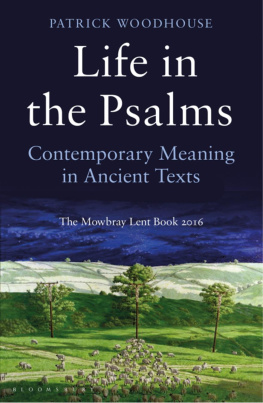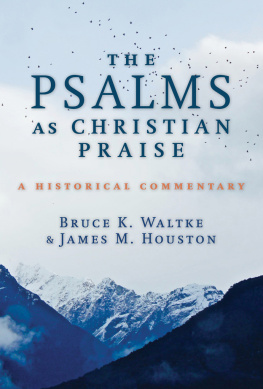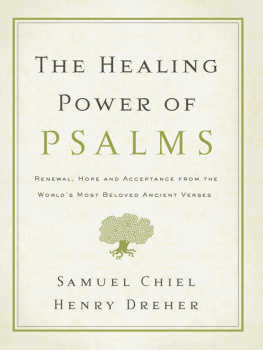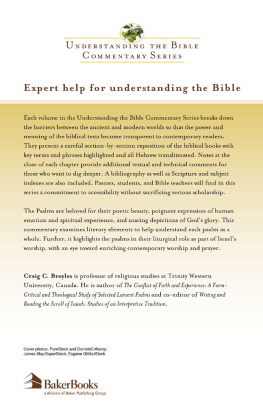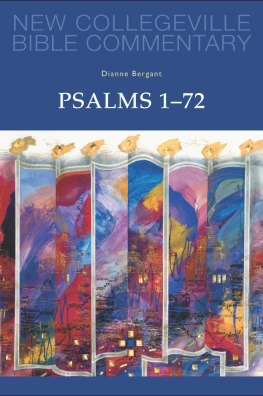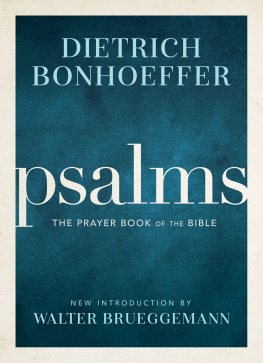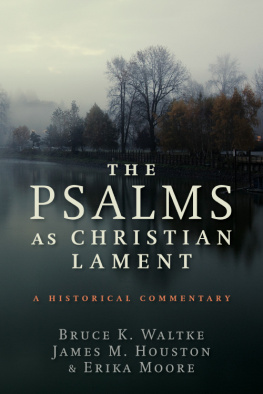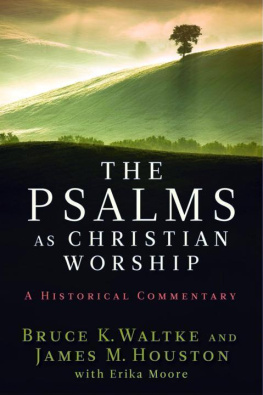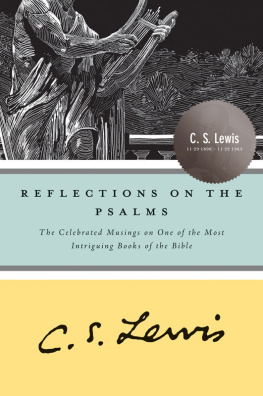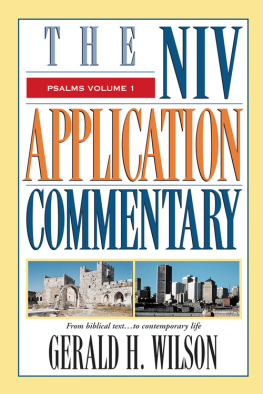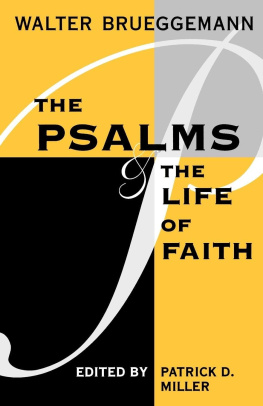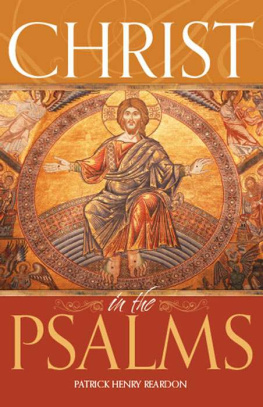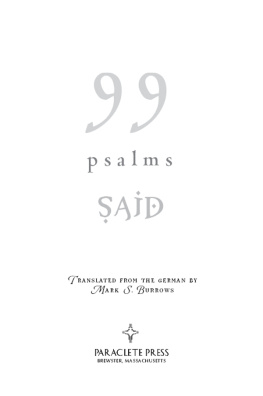
Life in the Psalms
Contemporary Meaning in Ancient Texts
Patrick Woodhouse

As a Canon at Wells Cathedral for thirteen years, I became very familiar with the Psalms. Each evening in the quire of the Cathedral they were sung as part of cathedral evensong. Each morning, in the silence and contemplative space of the Lady Chapel we recited them as part of our morning prayer. And yet, however familiar many of the phrases of these poems became, always they remained to me strange, even elusive. I could never escape the sense that these revered and ancient texts were from somewhere else, an ancient world far back in time whose meanings we cannot fully grasp. Between their ancient religious world and our contemporary secular world, there has always appeared to me to be a great gulf.
This book aims to address that gulf, and explore how in the midst of some of the issues and needs of our own times, these ancient texts can be re-imagined, so that their voices can more fully speak to us today.
The three introductory chapters set the stage. In these chapters, I ask the questions: Why the Psalms? What are the Psalms? And, conscious that these ancient songs and poems are prayers, how might we in our world now, pray the Psalms?
The main part of the book consists of the texts of thirty Psalms taken from Common Worship, each followed by a reflection whose purpose is to enable them to be heard again. The reflections do not presume to prescribe a definitive interpretation for today, but aim to stimulate further thought and imagination as we seek to make sense of them in a world which in so many respects is fundamentally different from the one in which they were formed. The Psalms chosen are those that particularly speak to me, but there are many others that readily lend themselves to this challenge of re-imagining.
How to use this book
For individuals
This book has been prepared for Lent, primarily with individuals in mind who aim to keep Lent reading and reflecting on a Psalm on a daily basis. So it has a particular shape. Five Psalms and reflections are printed for each of the six weeks of Lent, one for each weekday, beginning on the Monday following the first Sunday of Lent and ending on Good Friday. Saturdays and Sundays provide opportunity to read back over the texts and reflections of the preceding week.
The first days of Lent from Ash Wednesday to the following Monday could be a time to read through the three introductory chapters which prepare the ground for the Psalms that follow.
Most Psalms cannot be easily categorized, but in each week there is, loosely, an overarching theme:
In week one, as Lent begins, there are Psalms which touch on pilgrimage and journeying.
In week two, the emphasis is on the practice of prayer.
In week three, the Psalms chosen take us into the experience of wonder.
In week four, which includes three sections of Psalm 119, the way of faith is a theme.
In week five, as we move towards Holy Week, there are Psalms which explore hope.
Finally for Holy Week itself, there are Psalms exploring loss and suffering.
The book can of course be used at any time of the year, and some may prefer a slower pace over a longer period, perhaps reading and reflecting on one or two Psalms each week.
For groups
The texts and reflections could also be explored in groups in Lent or at any time of the year. Below are suggestions of Psalms and reflections which may be more suitable for group discussion. At the end of each of these reflections there are one or more questions to begin a discussion.
Week 1: Pilgrimage | 122 and 133 |
Week 2: Prayer | 123, 1 and 4 |
Week 3: Wonder | 8, 104 and 139 |
Week 4: The Way | 119.916; 119.12936, and 23 |
Week 5: Hope | 71, 46 and 36 |
Holy Week: Suffering | 137 and 22 |
Suggestions for study groups
Most groups meet once a week for the six weeks of Lent. Here are two suggestions as to how groups could use this book.
It would be helpful if everyone who attends the Lent group has their own copy of the book which they use during the week. At the group each week, each person would be invited to say, of the Psalms and reflections which they have read that week, which they found most helpful, and why, and what questions were prompted. In the first week this would include the introductory three chapters. Then a wider discussion could ensue.
The leader(s) of the group could choose two of the texts and reflections from the book which would then be discussed in the group. Everybody should have a copy of the text of the chosen Psalms which could be read aloud either responsorially by two groups taking alternate verses, or round the room. People are invited to share their thoughts and questions about the text of the Psalm before the reflection is read out, followed by further discussion. Two Psalms could probably be covered in one evening.
Over a meal with friends in the local pub, we were chatting about how we were spending time. I mentioned that I was working on a book about the Psalms and, curious to know how these texts were perceived, I asked, When you hear the word Psalms what comes to mind? There was a moments pause, before one of them, a strongly committed member of the Church of England and a long-standing lay reader, simply replied, Oh dear.
We laughed, and then she began to explain why, for her, other than some richly memorable verses, these ancient texts fail to generate any enthusiasm.
Were the question to be asked more widely, even among many church people, I suspect her response would not be untypical.
Reactions to the Psalms will of course vary hugely, depending on how much people see themselves as belonging or not belonging to a faith tradition, and to their experience of these texts.
Among people who do not belong to any faith tradition and are dismissive of the claims of religious faith, there might be recognition of the cultural value of the Psalms, but as for them being a resource for living in the secular scientific world of the twenty-first century, that would probably be regarded as ridiculous.
In contrast, among those for whom faith is important there will be many, certainly many within the Jewish tradition from which they come, who will treasure them.
They will treasure them because more than any other Old Testament texts they go to the heart of Hebrew religion, and because they are prayers tell us from the inside what it means to believe in the God of the Exodus, the God of the giving of the Law at Sinai, and the God who came to dwell in the great Temple in Jerusalem. So the Psalms remain to this day at the heart of Jewish worship.
Many in the Christian tradition will treasure them too, not least because they shaped the mind of Jesus of Nazareth, who would have almost certainly known them by heart. In the New Testament they are quoted more than any other book of the Old Testament. Many of the Psalms were understood as prophetic texts fulfilled in the life, death and resurrection of Jesus, and from its beginnings the church has read the Psalms through the lens of its faith in Jesus as the Messiah. So they remain at the heart of Christian worship. In monasteries, cathedrals, churches and homes wherever down the centuries Christians have gathered to pray the Psalms, sometimes read, often chanted or sung, have been central to the life of prayer.
Next page
